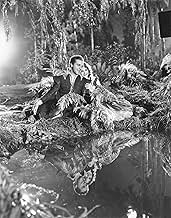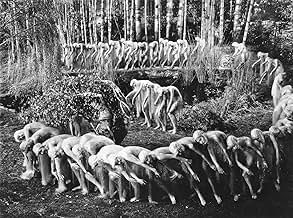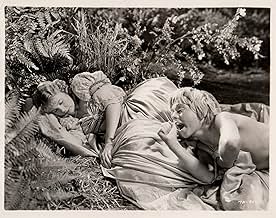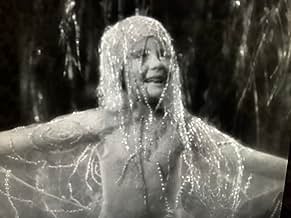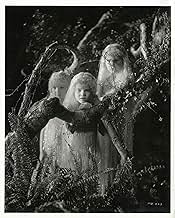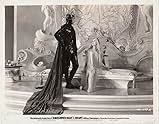IMDb RATING
6.8/10
4.1K
YOUR RATING
Two couples and a troupe of actors have an encounter with some mischievous fairies in the forest.Two couples and a troupe of actors have an encounter with some mischievous fairies in the forest.Two couples and a troupe of actors have an encounter with some mischievous fairies in the forest.
- Directors
- Writers
- Stars
- Won 2 Oscars
- 6 wins & 2 nominations total
Olivia de Havilland
- Hermia - In Love with Lysander
- (as Olivia de Haviland)
Nini Theilade
- Fairie - Attending Titania
- (as Nina Theilade)
- Directors
- Writers
- All cast & crew
- Production, box office & more at IMDbPro
Featured reviews
A Midsummer Night's Dream was to be Jack Warner's bow to culture back during the Depression. The economical studio which specialized in urban dramas was doing something that normally MGM would have taken the lead in. In fact I'm not so sure that Louis B. Mayer decided that if Warner Brothers could make Shakespeare popular, he could do it better and hence Norma Shearer got to star in Romeo and Juliet.
The great German Impresario producer Max Reinhardt with co-direction from another German emigrant, William Dieterle, put this together. He played to Warner Brothers other strength, those Busby Berkeley musicals and their intricate numbers. Visually, A Midsummer Night's Dream is stunning with an ethereal quality as the various faeries and nymphs go through the woods. They do their thing to Mendelsohn's great music as arranged by Erich Wolfgang Korngold. In fact this was the start of Korngold's relationship with the brothers Warner and some of the great musical scores he wrote for them.
This was also the start of Olivia DeHavilland's great career. Olivia is one of the few major stars who literally went from unknown to star in one fell swoop. She had graduated high school and was doing some summer stock before entering college when Max Reinhardt spotted here while touring America with A Midsummer Night's Dream. When Warner Brothers got his services for this film, he brought with him Olivia and personally cast her as Hermia.
The film was held up with editing, scoring, retakes, and Olivia made and was seen in two low budget films before A Midsummer Night's Dream was released. So her debut is in a Joe E. Brown film, Alibi Ike. But this is her first film.
The material was familiar to Olivia, but not all her fellow players at Warner Brothers were so blessed. Dick Powell said that this film was one of the two worst experiences he had while at that studio. He had no training of any kind to do this classical piece and said he was lost through out the whole production.
James Cagney is no classical actor either, but as Bottom with or without the donkey's head on him, courtesy of Puck, Cagney brings his boisterous style to the proceedings and it works for the most part. Some of the other tradespeople in the town Frank McHugh, Dewey Robinson and Joe E. Brown look pretty lost though.
On loan out from MGM, Mickey Rooney steals the show as Puck. On orders from Victor Jory the Faerie King to play a little joke on his wife Anita Louise, Rooney casts a spell on her that will make her fall for the first living soul she sees. Rooney decides on is own to sweeten the joke by giving James Cagney a donkey's head and making sure that Louise sees him first. And of course the four lovers, Dick Powell, Ross Alexander, Jean Muir, and Olivia DeHavilland, Rooney confuses their affections as well as a bonus.
Rooney who was another kid actor up to this point, got his first real critical notices in this. It led to his becoming a major star over at MGM and Louis B. Mayer never lending him out to anyone again as long as he was under contract there.
A Midsummer Night's Dream is a curious film. Shakespearean purists might recoil at some of the casting, but I'm sure it was entertaining enough for the Depression audiences.
The great German Impresario producer Max Reinhardt with co-direction from another German emigrant, William Dieterle, put this together. He played to Warner Brothers other strength, those Busby Berkeley musicals and their intricate numbers. Visually, A Midsummer Night's Dream is stunning with an ethereal quality as the various faeries and nymphs go through the woods. They do their thing to Mendelsohn's great music as arranged by Erich Wolfgang Korngold. In fact this was the start of Korngold's relationship with the brothers Warner and some of the great musical scores he wrote for them.
This was also the start of Olivia DeHavilland's great career. Olivia is one of the few major stars who literally went from unknown to star in one fell swoop. She had graduated high school and was doing some summer stock before entering college when Max Reinhardt spotted here while touring America with A Midsummer Night's Dream. When Warner Brothers got his services for this film, he brought with him Olivia and personally cast her as Hermia.
The film was held up with editing, scoring, retakes, and Olivia made and was seen in two low budget films before A Midsummer Night's Dream was released. So her debut is in a Joe E. Brown film, Alibi Ike. But this is her first film.
The material was familiar to Olivia, but not all her fellow players at Warner Brothers were so blessed. Dick Powell said that this film was one of the two worst experiences he had while at that studio. He had no training of any kind to do this classical piece and said he was lost through out the whole production.
James Cagney is no classical actor either, but as Bottom with or without the donkey's head on him, courtesy of Puck, Cagney brings his boisterous style to the proceedings and it works for the most part. Some of the other tradespeople in the town Frank McHugh, Dewey Robinson and Joe E. Brown look pretty lost though.
On loan out from MGM, Mickey Rooney steals the show as Puck. On orders from Victor Jory the Faerie King to play a little joke on his wife Anita Louise, Rooney casts a spell on her that will make her fall for the first living soul she sees. Rooney decides on is own to sweeten the joke by giving James Cagney a donkey's head and making sure that Louise sees him first. And of course the four lovers, Dick Powell, Ross Alexander, Jean Muir, and Olivia DeHavilland, Rooney confuses their affections as well as a bonus.
Rooney who was another kid actor up to this point, got his first real critical notices in this. It led to his becoming a major star over at MGM and Louis B. Mayer never lending him out to anyone again as long as he was under contract there.
A Midsummer Night's Dream is a curious film. Shakespearean purists might recoil at some of the casting, but I'm sure it was entertaining enough for the Depression audiences.
Early Hollywood wasn't known for its high-brow culture, and this film was an important step in enriching the cinema. The opening titles reveal how proud Warner Brothers were to have done it, and what a production it was indeed: all the top Warner's stars, the best technical support in the world, a top composer of the day in Erich Korngold, ballet choreography by Nijinska, and the highly respected Max Reinhardt as director. You couldn't have asked for more in those energetic movie days.
And, happily, it works! It's still beautiful, exciting, technically enthralling--and very funny! There are too many great performances to single out even one; but as an ensemble, the "players" are marvelous. No one seems stilted; everyone is right at home; even though most of these individuals hadn't been trained to the classical stage--they were just good! and, incidentally, it just goes to show the timelessness of the play itself.
Some scenes today seem overlong, and I think someone should have toned down little Mickey Rooney a good bit, but all in all it's a triumph. Midsummer or not, it's a sweet interlude.
And, happily, it works! It's still beautiful, exciting, technically enthralling--and very funny! There are too many great performances to single out even one; but as an ensemble, the "players" are marvelous. No one seems stilted; everyone is right at home; even though most of these individuals hadn't been trained to the classical stage--they were just good! and, incidentally, it just goes to show the timelessness of the play itself.
Some scenes today seem overlong, and I think someone should have toned down little Mickey Rooney a good bit, but all in all it's a triumph. Midsummer or not, it's a sweet interlude.
While the 1999 version is receiving mixed reviews, this classic version with a star-studded cast is delightfully mischievous. Mickey Rooney, a very young boy, has never been better cast, nor delivered a better performance. And despite the dream sequences not always being clearly distinguished from real time motion, one catches on quickly enough. Everyone, even Dick Powell, delivers his lines mellifluously, something that cannot be said for the 1999 version. There's more energy and zeal, more mystery and charm, more color(though B&W) and clarity, despite its age. Remarkable performances under exellent direction work together to make the Bard sparkle, and the film enchant.
Though another commentator disagrees, if Rooney is not the greatest Puck you've ever seen, then tell me who is. With all respect to a talented actor, the sad part is that he played his greatest role when he was, what, 14?
The greatest Shakespeare movie of all time, in my opinion. The dazzling cinematography for its age. The fact that they got the mostly American actors to speak the lines properly. That inspired scene with a fairy jazz band. The special "star spangled" effect.
The criticism that scenes are overly long is related to a more modern perception of how long a scene should be, and alas, Shakespeare is mostly unmercifully cut (look at Olivier's last "King Lear"--Branaghs "Hamlet" would be an exception). Shakespeare just wrote long scenes. You woulnd't have Juliet on the balcony just say "I love you, Romeo," and disappear.
The greatest Shakespeare movie of all time, in my opinion. The dazzling cinematography for its age. The fact that they got the mostly American actors to speak the lines properly. That inspired scene with a fairy jazz band. The special "star spangled" effect.
The criticism that scenes are overly long is related to a more modern perception of how long a scene should be, and alas, Shakespeare is mostly unmercifully cut (look at Olivier's last "King Lear"--Branaghs "Hamlet" would be an exception). Shakespeare just wrote long scenes. You woulnd't have Juliet on the balcony just say "I love you, Romeo," and disappear.
I came across this movie one rainy afternoon on TV. Jimmy Cagney doing Shakespeare? Surely not! My expectations were, frankly, low. We English are a bit funny about Shakespeare, as you can imagine, and the thought of the dirty rat as one of the bard's greatest comic creations was worrying, to say the least. The whole film is, however, magical. I laughed out loud at the wall joke, even though I knew what was coming, and Roony's Puck was, as another contributor says, probably his best performance. Bottom's realisation that he is now the proud possessor of an ass's head is quite affecting. It's Titania's fairies, though, that make this such a wonderful experience. I have seen this a couple of times since that rainy afternoon, and am always convinced that it will not live up to my expectations. It always does, though. The sheer beauty of the scene where the fairies awake is, as we say over here, gob-smacking. I am sure that this could never be done with such picturesque quality in colour. I had this on tape for a long time, and then I lent it to some eejit who erased it. I scan the listings every week to see if it's on TV, and when it is I shall make sure that it never leaves my possession.
Did you know
- TriviaWhen the forest that Max Reinhardt designed could not be lit properly, cinematographer Hal Mohr thinned the trees slightly, sprayed them with aluminum paint and covered them with cobwebs and tiny metal particles to reflect the light. As a result, he became the first (and only) write-in winner of an Academy Award.
- GoofsCorrective lenses were introduced in the 13th century so they could have been worn in Shakespeare's time.
- Quotes
Hermia, in Love with Lysander: [to Helena] How low am I, you painted maypole? Speak! How low am I? I am not yet so low but that my nails can reach into your eyes!
- Crazy creditsThe opening credits appear as if they were "trickling down" from the top of the screen.
- Alternate versionsThe original 132-minute roadshow version of this film has been restored, shown on cable, and issued on videocassette and DVD. For many years, though, this film was shown only in its general release version, a 117-minute version painstakingly edited by the studio (so that the cuts would not be noticeable), which shifted the order of some sequences and eliminated others.The 2007 DVD release also restores the Intermission title card, not seen since the film's original roadshow release in 1935, as well as including the overture and exit music.
- ConnectionsFeatured in A Dream Comes True (1935)
- SoundtracksA Midsummer Night's Dream: Overture and Incidental Music
(1826) (uncredited)
Music by Felix Mendelssohn
Adapted by Erich Wolfgang Korngold
Heard throughout the film
- How long is A Midsummer Night's Dream?Powered by Alexa
Details
- Release date
- Country of origin
- Official site
- Language
- Also known as
- A Midsummer Night's Dream
- Filming locations
- Production companies
- See more company credits at IMDbPro
Box office
- Gross worldwide
- $2,616,000
- Runtime2 hours 13 minutes
- Color
- Sound mix
- Aspect ratio
- 1.37 : 1
Contribute to this page
Suggest an edit or add missing content

Top Gap
By what name was Le songe d'une nuit d'été (1935) officially released in India in English?
Answer

